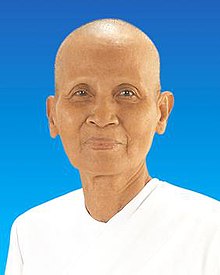Chandra Khonnokyoong | |
|---|---|
 Chandra Khonnokyoong | |
| Title | Khun Yay Maharatana Upasika |
| Personal life | |
| Born | 20 January 1909[1][2] |
| Died | 10 September 2000 Bangkok, Thailand |
| Religious life | |
| Religion | Buddhism |
| School | Mahānikāya, Dhammakaya tradition |
| Senior posting | |
| Teacher | Luang Pu Sodh Candasaro, Thongsuk Samdaengpan |
| Based in | Wat Phra Dhammakaya, Pathum Thani, Thailand |
| Successor | Luang Por Dhammajayo |
Chandra Khonnokyoong (Thai: จันทร์ ขนนกยูง; RTGS: chan khonnokyung, 20 January 1909 – 10 September 2000) was a Thai Maechi (nun) who founded Wat Phra Dhammakaya. Religious studies scholar Rachelle Scott has described her as "the most influential female meditation teacher in Thailand".[3][4]: 503 Her own students call her Khun Yay Achan Mahā-ratana Upasika Chandra Khonnokyoong (Khun Yay Achan, for short), an honorific name meaning "grandmother-master-great-gem devotee".[5][note 1] Although illiterate, she was widely respected for her experience in meditation, which is rare for a maechi. She managed to attract many well-educated students, despite her rural background and illiteracy.[7] Some scholars have raised the example of Maechi Chandra to indicate that the position of women in Thai Buddhism may be more complex than was previously thought.[4][8]
- ^ "The Master Nun – Dhammakaya Foundation". Dhammakaya Foundation. Retrieved 18 January 2024.
- ^ "Masters – Dhammakaya Foundation". Dhammakaya Foundation. Retrieved 18 January 2024.
- ^ Cite error: The named reference
Scott 2016was invoked but never defined (see the help page). - ^ a b Scott, Rachelle M. (2010). "Buddhism, miraculous powers, and gender: Rethinking the stories of Theravāda nuns". Journal of the International Association of Buddhist Studies. 33 (1–2).
- ^ Cite error: The named reference
Seeger1was invoked but never defined (see the help page). - ^ Cook, Nerida M. (1981). The position of nuns in Thai Buddhism: The parameters of religious recognition (Ph.D. Thesis). Research School of Archaeology and Anthropology, Australian National University. p. 153. hdl:1885/10414.
- ^ Gombrich, R. (1996). "Freedom and Authority in Buddhism". In Gates, B. (ed.). Freedom and Authority in Religions and Religious Education. London: Cassell. p. 11.
- ^ McDaniel, J (2006). "Buddhism in Thailand: Negotiating the Modern Age". Buddhism In World Cultures: Comparative Perspectives. Santa Barbara: ABC-CLIO. pp. 101–28. ISBN 1-85109-787-2.
Cite error: There are <ref group=note> tags on this page, but the references will not show without a {{reflist|group=note}} template (see the help page).
